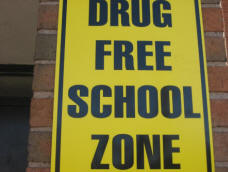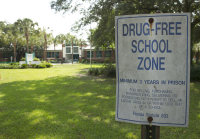Like many other states, New Jersey adopted "drug-free school zone" laws in the 1980s in a bid to stop that iconic drug war menace, the dope peddler lurking in the schoolyard shadows trying to hook our kids on their fiendish wares. Now, in good measure because of its drug-free school zone law, which applies harsh mandatory minimum sentences to areas reaching far beyond any school's walls, the Garden State boasts the dubious distinction of having the highest percentage of prisoners -- 35% -- behind bars for drug offenses.

While the language of the law is color-blind, its effect has been racially pernicious. In the dense urban environment where the state's minority populations are concentrated, the law in effect turns huge swathes of the landscape into drug-free school zones and subjects most urban drug offenders to prosecution under that law. Nineteen out of every 20 people prosecuted under the law are black or brown.
In 2005, the New Jersey Commission to Review Criminal Sentencing issued a groundbreaking report on the law, with a supplemental publication released in 2007. The commission found that the zones were ineffective in reducing drug offenses within the designated areas, while at the same time disproportionately affecting minority communities through its "urban effect."
Pressure has been building to reform the law ever since. The Drug Policy Alliance (DPA) New Jersey office, headed by Roseanne Scotti, has been prowling the corridors of the statehouse in Trenton seeking to build a winning strategy. DPA added further fuel to the flames earlier this year with its own report, "Wasting Money, Wasting Lives: Calculating the Hidden Costs of Incarceration in New Jersey." The report found that in addition to the approximately $331 million that New Jersey spends each year to incarcerate nonviolent drug offenders, the state loses millions more in taxable income from the lost wages of those incarcerated for nonviolent drug offenses.
Despite winning the support of Assembly Majority Leader Bonnie Watson Coleman, reformers could not gain passage of an earlier bill, which would have reformed the law by limiting the drug-free zones to 200 feet. But on Monday, the state Assembly took a big step toward reforming the drug-free school zone law, passing by a two-to-one margin a compromise bill that would restore a measure of judicial discretion in sentencing. Under the bill, A-2762, judges would be authorized to allow consideration of parole or probation on a case-by-case basis for some people convicted of distributing, dispensing, or possessing with the intent to distribute a controlled dangerous substance while on or within a Drug Free School Zone. The following factors could be applied when weighing whether to apply a mandatory minimum sentence:
- The extent of the person's prior criminal record and the seriousness of the offense;
- Where the offense was committed in relation to the school property, including distance from the school or bus and the reasonable likelihood of exposing children to drug-related activities there;
- Whether school was in session at the time of the offense; and
- Whether children were present at or in the immediate vicinity of where the offense occurred.

Now, the bill heads for the Senate, which is unlikely to address it before fall. The bill's sponsors and supporters are urging the Senate to follow their lead.
"Our current Drug-Free School Zone law does not work," said Assembly Majority Leader Bonnie Watson Coleman (D-Mercer), one of the bill's cosponsors. "The mandatory minimum sentencing the zones require has effectively created two different sentences for the same crime, depending on where an individual lives. This is geographic discrimination at its most basic, and it is something to which I am adamantly opposed."
"Our insistence on mandatory minimums combined with the disparate geographic distribution of Drug-Free School Zones has created a situation in which 96% of the individuals imprisoned for dealing drugs within the zones are black or Hispanic," said cosponsor Assemblyman Gordon Johnson (D-Bergen), chair of the Assembly Law and Public Safety Committee, in a statement made available to the Chronicle by his office. "When a policy so disproportionately affects a single group, we must take corrective action."
"Judges should have the discretion to craft fair and effective sentences and not waste taxpayer money," said DPA's Scotti. "It costs more than $46,000 a year to incarcerate someone in New Jersey. If someone doesn't deserve the additional penalty and if the additional penalty does nothing to improve public safety, mandating an additional penalty is just throwing taxpayer money down the drain. It damages the individual's ability to earn a living and become a productive member of society and it shrinks New Jersey's tax base. The bottom line is that New Jersey can't afford ineffective mandatory minimum sentences."
The state legislature is going on summer break soon, but Scotti said the push would be on in the Senate in the fall, and organized opposition is scarce. "There hasn't really been any," she said. "The prosecutors are for this, the state probation office is for this. The Assembly passed it overwhelmingly. There are some legislators who don't like it, but that seems to just be that old amorphous fear of being called soft on crime and drugs."
Maybe, just maybe, New Jersey is ready to make a break with the past. While the drug-free zones will still exist, at least judges would have the option of not sending all offenders to prison. That could be a start on shaving away at that $331 million annual prison bill. Now, it will be up to the Senate.
Comments
Feeling it
As the economy worsens and finally even the State starts to feel the pinch, expect more change in this direction as the realization sinks in that "we just can't afford our current policies".
Drug Free School Zone is an
Drug Free School Zone is an oxymoron! When the heck will the legislators grow some B_LLS and cancel the whole idea and put the real money into the real work of prevention education! an elementary school teacher
70's policy
[email protected],Vancouver,B.C.Canada I can remember when they passed similar legislation here.It was in the late sixties when everyone was afraid of the dope dealing,pot smoking,rock and roll playing,communal living hippie menace.We had to move because there was a school just across the street.We soon found that the boundaries included just about every square foot in the lower main land.I forget exactly what the penalty was but it was no joke as it was pretty much a federal beef if you got caught with any drugs back then.People went to the pen for pot.I don't remember the law ever being repealed but it must be ignored at the very least as I haven't heard the act mentioned in recent memory.
[email protected]
Keep the Drug Free School Zone law! Some people are too stupid to change their misbegotten ways. I am sick and tired of people complaining about laws because they want to smoke pot or do other drugs. There is no reason why people who don't do drugs should tolerate people who do, and who sell drugs near schools, parks, or wherever.
KEEP THE LAW!!!
Add new comment